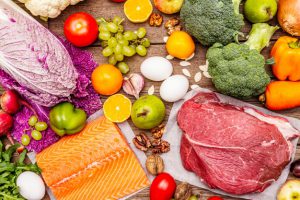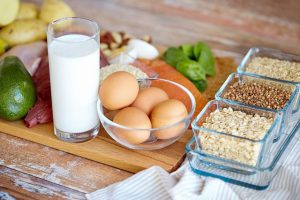Protein is a type of nutrient which is very important in the daily diet and is useful in making some hormones, enzymes, and antibodies. Most proteins found in a variety of plant and animal sources, including red meat, white meat, seafood, beans and peas, eggs, processed soy products, and grains. Consumption of proteins as one of the essential nutrients helps the body to perform main functions, for example, building and repairing muscles, bones, and organs, regulating hormones, and maintaining immune function.
However, excessive protein intake not only does not help people’s health but also causes problems. The amount of protein that each person is allowed to consume daily depends on factors such as age, sex, weight, and level of physical activity.
How much protein should you eat per day?
Experts recommend protein for weight loss, and they have a good reason because it regulates appetite and fixes hunger. But if your focus is on the main meals to add it to your diet, you may get more than you need. It is recommended not to eat more than 20 to 30 grams of protein per serving. It is better for women aged 19 to 70 to receive 46 grams daily.
Why are only 20 to 30 grams of protein per serving recommended?
Increasing its consumption is indeed good for weight loss, but the body just can receive only 20 to 30 grams of protein at a time. Eating this amount in each meal is a good goal because this amount can both satiate you and the maximum amount that the body can absorb. So you have space for other nutrients that your body needs.
To lose weight in a complete meal, you should always combine it with carbohydrates to give you sustained energy. Healthy fiber and fats also help you feel full for longer. So you do not need to add eggs beside the smoothie you eat in the morning, do not need to focus on animal proteins, Plant Protein such as legumes, leafy vegetables, whole grains, nuts, and soy products are essential for everyone. Vegetable proteins help reduce heart disease, cancer, and weight control.
Recommended dietary allowance (RDA) of protein, based on age
|
|
Protein Needed (grams/day) |
|
Age 1 – 3 |
13 |
|
Age 4 – 8 |
19 |
|
Age 9 – 13 |
34 |
|
Age 14 – 18 (Girls) |
46 |
|
Age 14 – 18 (Boys) |
52 |
|
Age 19 – 70+ (Women) |
46 |
|
Age 19 – 70+ (Men) |
56 |
Reference:https://www.calculator.net/
Foods high in protein
Many people on balanced diets, the diet includes all types of food, which usually get enough protein but, it is necessary to get a complete protein, contains all 9 essential amino acids. Foods that contain complete proteins include red meat, fish, eggs, many dairy products, and soybeans. Fruits, vegetables, and whole grains usually lack some of the amino acids, but we can combine them to make a complete protein meal.
Many foods are naturally high in protein, the most common of them:
|
Meat/Dairy examples |
Vegan/plant-based examples |
|
|
Why don’t you pay attention to fruit protein?
For knowing food as a source of protein, it must have at least 6 grams of protein in one serving. Whole grains, fruits, and vegetables have a limited amount of protein, but their protein is usually not complete protein type, and they have other macronutrients.
Fruits include some protein but, it’s not too much, and usually, the most things we receive from them are carbohydrates. Generally, one-half cup of fruit contains about 15 grams of carbohydrates from a natural source of sugar, such as glucose, fructose, and fiber.
These carbohydrates help to fuel the body and the process of protein synthesis. Foods that provide carbohydrates, like many fruits, give us energy and fiber that allow the body to store protein for muscle growth, repair, and establishment.

Complete or incomplete protein
The first question about protein is what is it exactly? Proteins are made of small compounds called amino acids. There are 9 essential amino acids that your body needs to get from the diet because the body can’t produce them, and they are very important for us. Animal foods provide all the essential amino acids. So, animal foods call a complete protein, and plant foods are an incomplete protein. If you consume only plant protein, you should have a varied diet so that you can get all the amino acids.
Can you eat only vegetable protein?
You can eat only plant protein and still get all the essential amino acids. To do this, you need to eat a variety of plant foods, including grains, nuts, seeds, legumes, and soy. Soy and whole grains consider quality plant proteins because they contain high amounts of essential amino acids. People who eat the only plant food can get all the essential amino acids into their bodies, as long as they can eat a variety of foods.
Animal protein VS Vegetable protein
Meats food is considered high-energy food, With about 75% protein in dry weight versus 30% of average protein for low energy plant foods. Animal protein sources contain the appropriate amount of amino acids, which makes their protein synthesis much higher than that of plants. proteins of animals also contain creatine, taurine, carnosine, and glutathione, important metabolic compounds that plant protein lacks all them.
Red meat and their organ meat (such as the liver) are also rich sources of essential B vitamins and minerals.
Soy, peas, rice, and other plant proteins are deficient in certain types of amino acids (also called essential amino acids), including lysine, methionine, and tryptophan, which the body needs. However, leafy vegetables and cruciferous vegetables such as spinach, cabbage, and sprouts contain peptides that are essential for some metabolic functions.
Summary
SunExport, Best dates company, export high-quality types of dates and dates products (Date syrup, Date sauce, Date paste, Date cream….) to all around the world. We also export freeze-dried and dried fruits in high quality and best price.
For Pricing and order, please contact us.

